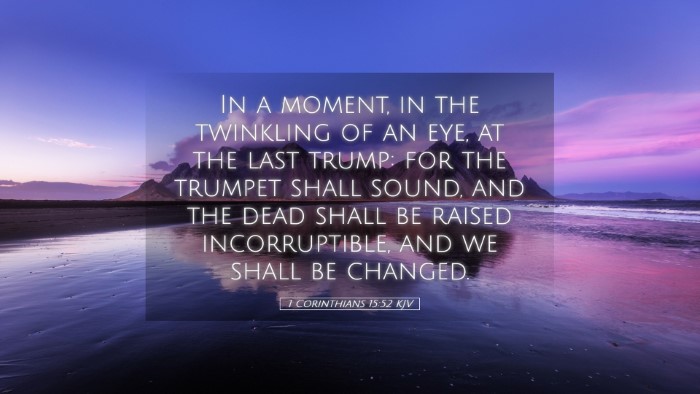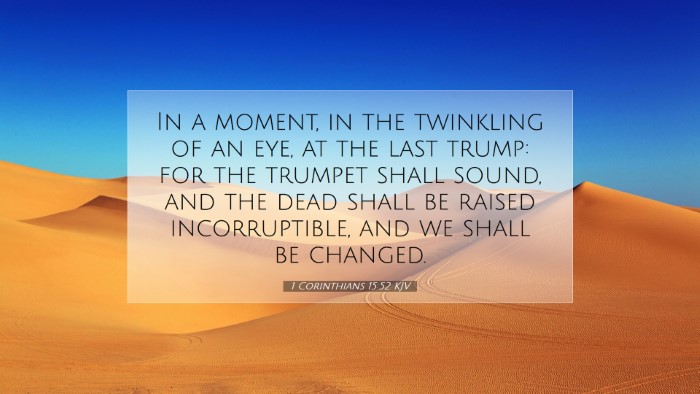1 Corinthians 15:52 - Commentary Summary
"In a moment, in the twinkling of an eye, at the last trump: for the trumpet shall sound,
and the dead shall be raised incorruptible, and we shall be changed."
Introduction
The Apostle Paul, in this profound chapter of 1 Corinthians, addresses the resurrection of the dead,
a cornerstone of Christian doctrine. Verse 52 serves as a pivotal statement regarding the
transformation that believers will undergo at the return of Christ.
Exposition of the Verse
- “In a moment, in the twinkling of an eye”
Paul emphasizes the swiftness of the event—this transformation occurs instantaneously.
According to Matthew Henry, he likens this to the rapid change that occurs with human
perception, highlighting the unexpected nature of the Second Coming. Adam Clarke expands on this,
noting that the "twinkling of an eye" denotes a significant shift, emphasizing both the rapid
and transformative power of God’s action.
- “At the last trump”
The reference to the ‘last trump’ signifies a divine call, summoned for the resurrection.
Albert Barnes discusses this as the final event in God's redemptive plan, illustrating the
call that awakens the dead and unites believers with Christ. This ‘trumpet’ serves as a metaphor
for God’s authority and the moment of climactic victory over death.
- “For the trumpet shall sound”
This section speaks to the certainty of the event. As presented by Henry, the sound of the trumpet
symbolizes the authoritative call to resurrection, reminiscent of ancient practices where a trumpet
signaled important announcements. All of creation will respond to this call, making it a universal
event affecting both the living and the dead.
- “The dead shall be raised incorruptible”
Here, Paul assures believers of their ultimate victory over death. Barnes notes that "incorruptible"
indicates a new, glorified state free from decay and sin. Clarke emphasizes that this speaks
to a complete transformation, contrasting the mortal state with the eternal glorified body
believers will receive.
- “And we shall be changed”
Paul concludes with the promise of change for those who are alive at Christ’s return. Henry suggests
this is an assurance of not only resurrection but also a deeper spiritual transformation that
reflects Christ's own glory. Clarke adds that the change involves the perfection of believers'
bodies, fitting them for eternal dwelling with God.
Theological Implications
This verse offers rich insights into the doctrine of resurrection. It emphasizes God's sovereignty
in transforming lives and articulates the future hope of believers. It challenges the natural
understanding of life and death, presenting a miraculous work of divine grace.
Application for Believers
- Hope in the Resurrection
Believers are encouraged by the assurance of resurrection, giving comfort in times of grief
and loss, as emphasized by Paul throughout the chapter. The promise found in this verse is a
source of strength and encouragement.
- Living in Expectation
Paul’s description invites believers to live expectantly, striving for holiness while
awaiting the return of Christ. This anticipation shapes Christian ethics and lifestyle as
they realize their ultimate destiny in Christ.
- Proclaiming the Gospel
The message of resurrection serves as a critical aspect of evangelism. Understanding and discussing
the hope presented in 1 Corinthians 15:52 is vital for believers to share the Gospel and
testify of Christ’s power over death.
Conclusion
In 1 Corinthians 15:52, Paul encapsulates the transformative hope found in the resurrection.
By merging insights from historical commentaries, this passage underscores the magnificent truth
of a momentary yet eternal change that will accompany the trumpet call of God. For pastors,
students, theologians, and scholars, the implications of this verse resonate deeply, reminding us
that the promise of resurrection is not only a future event but an impactful reality that shapes
Christian living today.


